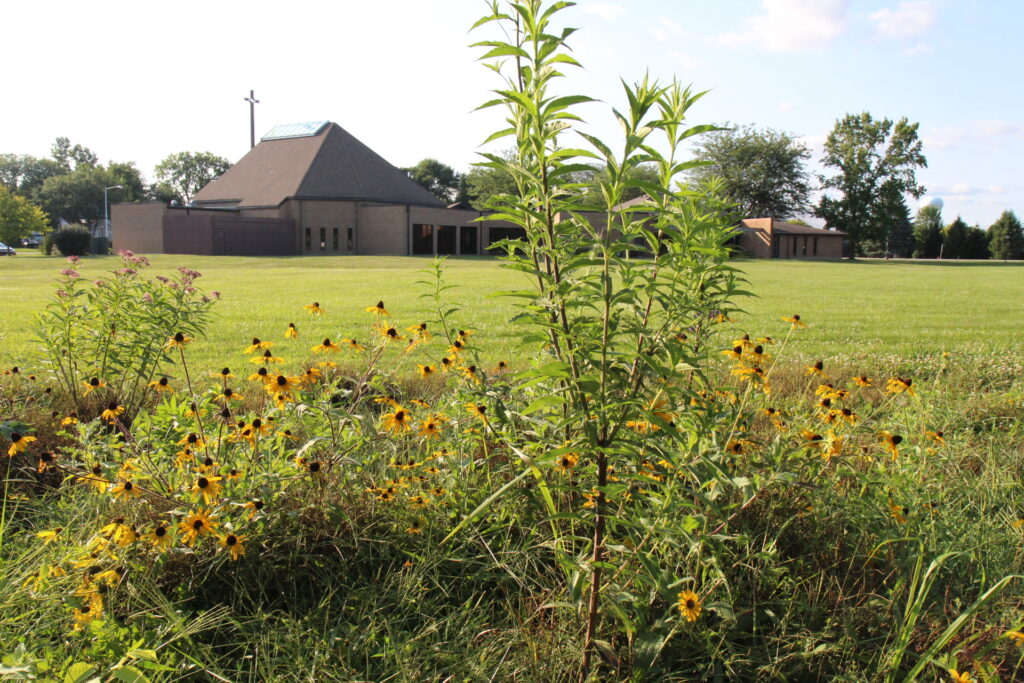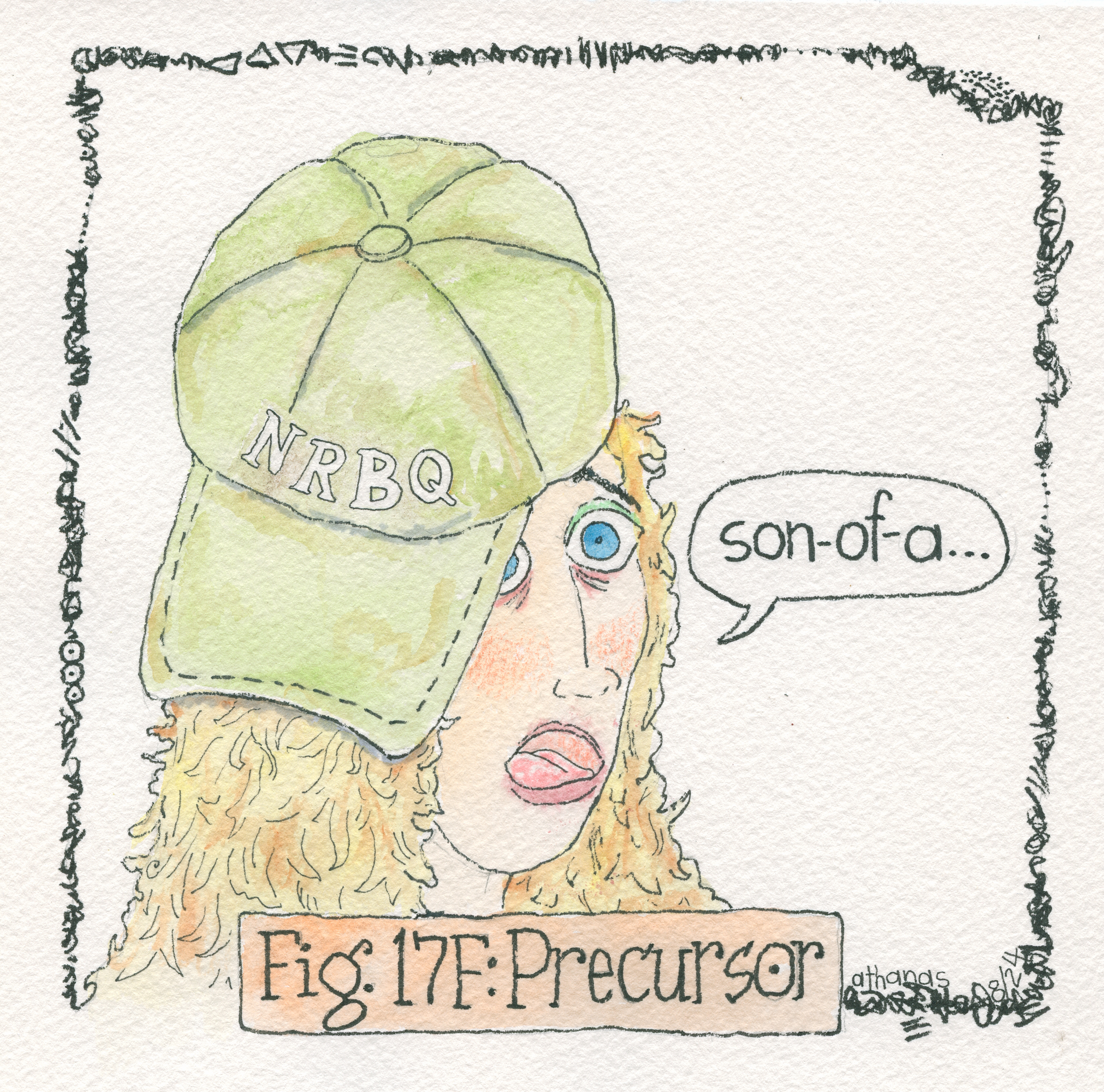The influence of ‘The Boss’
Bruce Springsteen covered by the Homewrecker in smoky, dank little bars
In November 1973, Bruce Springsteen released The Wild, The Innocent & The E Street Shuffle.
Springsteen was signed to Columbia Records (label to Bob Dylan, Miles Davis, Simon & Garfunkel, Leonard Cohen, amongst other greats) and had released one previous LP, the underperforming Welcome to Asbury Park.
Initially, the second album didn’t perform much better than its predecessor. FM radio, although better than it is today, was beginning to undergo its transformation into an over-analyzed, money-making, staid enterprise. Springsteen’s second output was not rife with the Journey/Kansas/Styx drech to warrant any sort of staying power on the FM bandwidth (isn’t that ironic?). But fate was not done with this Jersey kid.
Sometime in January 1974, at approximately 2:30 in the morning, I was driving home after a gig at The Zodiac Lounge on Sylvania Avenue in Toledo. My band at the time was The Raisin Band. I wish to state that this is not to be confused with the current conglomerate known as The Raisins, based in Cincinnati, yet containing two of the members (Rob Fetters and Bob Nyswonger, both musicians extraordinaire) that I played with. Confused yet?
Anyway, I was living in the Old West End, on Rockingham, with a glass blower for a roommate. After getting off I-475, I flipped on WIOT, the powerhouse album rock station of Toledo. Expecting to hear The Doors, Led Zep or the aforementioned dismal offerings (my opinion) that commandeered the FM airwaves in those days, there was instead a fresh, wonderfully alluring sound emanating from the radio of my Toyota Corolla! How DARE this DJ pop the unexpected into my tired auditory canal in the wee hours!
This song, totally new to me, woke me from my driving stupor, excited me and even put a smile on my face. Even the structure of the song was different – not the typical “verse-chorus-verse.” No, this slice of rock’n’roll bravely rambled all over the airwaves, going verse-chorus-verse, then – wait, what was that?? winding up (never down) in a huge “HEY! HEY! HEY! HEY!” group chorus, and ending in an insane runaway guitar loop on an echo chamber. Something like this hadn’t happened to my ears in a long time! And all over a shitty car speaker!
I quickly parked my car, ran up the stairs to my second-floor home, and grabbed the phone – landline, y’know. I must’ve called information to get the number of the station first, then dialed it.
An aside: DJs in those days (maybe still?) were infamous for not picking up the phone. Sure, there were whackos out there who would taunt the DJ or request “In-A-Gada-Da-Vida” 90,000 times per shift, but couldn’t the DJ tell by the sincere tone of my ring that I was DESPERATE to find out who did this magnificent song?
After approximately 15 minutes of ringing, the on-air personality finally picked up. He was confronted with a maniac.
YEAH, I WAS JUST DRIVING IN MY CAR AND YOU PLAYED A SONG. IT WAS GUITAR DRIVEN, SAXOPHONE, GRAVELLY VOICED SINGER, SINGIN’ ABOUT SOME GIRL!! . . .
Steven J Athanas

Calmly, the DJ responded. “Umm, yeah, that was Bruce Springsteen.”
”WHAT WAS THE NAME OF THAT SONG???” I demanded to know.
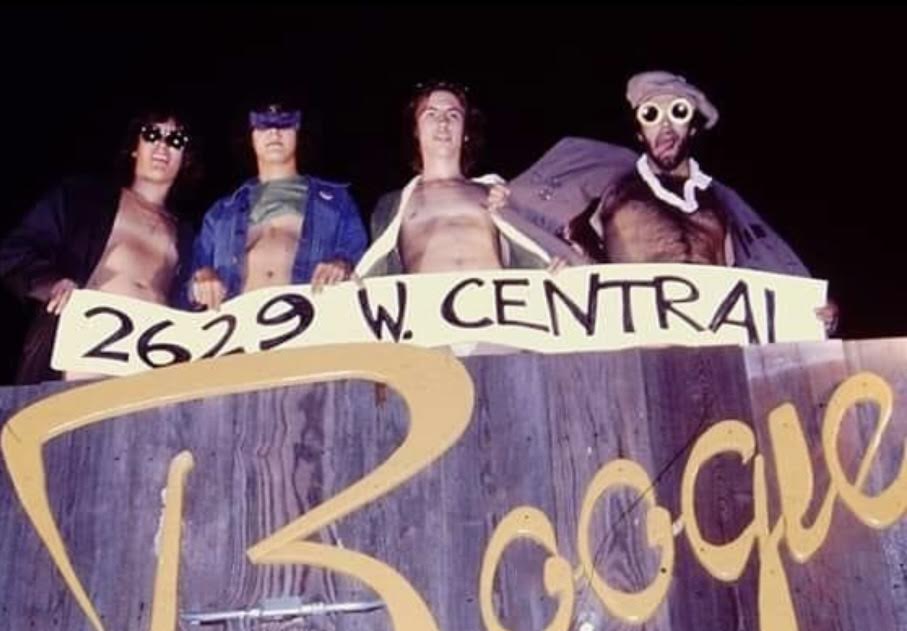

A pause. “Rosalita,” he said, “then (Come Out Tonight) in parentheses.” This DJ was nothing if not thorough.
The next day I drove to Boogie Records, when it was still on Central at Douglas, and ran into the store. I worked there as a cashier and music aficionado (ha ha!), so I greeted the person there and quickly went to the S’s in the rock’n’roll section. Thumbing through the section: Steppenwolf, Steeleye Span, Sam & Dave, Santana.
And then, there it was – a portrait of a scraggly-bearded guy looking off to the side, rubbing his mustache with his right hand. And for $3.99 (a red dot at Boogie), I owned a copy of a record that would shape my musical persona for a good many years to come. I know I wore out at least four copies of that LP. Then, technology graced me with a CD that stood up much better.
At the very next Raisin Band rehearsal, I told the fellas about this New Jersey punk, and shortly thereafter we were doing our version of “Rosy,” as it affectionately became known. And for four to five decades my bands invariably added the tune to our roster. Crowds loved it, demanded it! From The Raisin Band to The Homewreckers, we would most assuredly end the night with it. Now that’s staying power!
According to Forbes Magazine, Bruce Springsteen, at 74, just achieved the status of becoming a billionaire – yeah, with a “b”. Although I don’t follow him as heavily as I used to, he’s still out there, putting on three-to-four-hour performances, pleasing the masses.
After the release of The Wild, The Innocent . . ., he got hip to Woody Guthrie, and became the rocker with a message, a musical representative of the people. Whereas, that second album was all over the musical map: rock’n’roll, jazz, funk, folk – FUN! He’s settled to me. Nevertheless, he deserves it.
But, y’know what? You’re welcome, Bruce, for all the copies of The Wild, The Innocent and The E Street Shuffle purchased by those inebriated Toledoans and BG-ans (?) who had spent the night before in some smoky, dank little bar listening to this guy’s band covering the soon to be crowned Boss’ music.
Wild Side | Night herons
Black-Crowned Night Heron’s nocturnal habits and nesting patterns
CURTICE – Long necks and long legs are the hallmarks of the great blue herons and great egrets we’re used to seeing in our marshes and river rapids.
Shorter and lacking both the long neck and legs, black-crowned night herons are also shy and not seen as often. It starts with their nocturnal habits that keep them in the shadows during daylight, revealing themselves only as dusk settles onto our wetlands.
While they nest in colonies like their heron cousins, the party is over for the night herons when the young fledge and they all go their own way.
You’re most likely to see them one or two at a time, their sturdy bodies hunched and virtually frozen on a low hanging perch, waiting for a meal to come into range. While the adult night herons may have been shorted on neck and legs, they weren’t shorted on looks. They’re simply elegant with a deep black back and cap over pale gray wings that fade underneath to paler gray and white. The heavy darkish bill leads to a dark line that ends dramatically in the adult’s bright red eyes. It’s a deep and menacing red that bodes ill for its prey.
This image was captured late in the afternoon earlier this week at Howard Marsh Metropark in Curtice, Ohio. Its distinctive call, which has been described as a barking squawk, gave away its location before it appeared, crashing through a dense stand of cattails.
Flavor in the 419 debuts
Get a taste for freshness, locally grown ingredients in new foodie column
I’m proud to be a new columnist with Flavor in the 419, a foodie section that will profile the local food scene. From Sylvania to Bowling Green, and from Swanton to Oregon, I will feature food trucks, restaurants, technologies and innovations shaping our modern food culture.
My focus will be on freshness and locally grown ingredients, along with local purveyors of organic, free-range, grass-fed and humanely butchered products, where quality and craft combine.
There will be stories about food finder apps, reddit resources, commercial kitchens, food safety, recipes, importers, wholesalers, caterers, private clubs and the rules and regulations that ensure a healthy marketplace.


We are excited to profile our local multinational companies, too! Did you know Smuckers and Pillsbury have factories in Toledo? We are also excited to showcase a diaspora of food catering to tastebuds near and far!
I’m not going to write like a critic in the traditional sense, criticizing and lauding final dishes, but will strive to feature restaurant owners and their stories behind the products. I want to connect audiences with tastemakers who craft quality food and lead people along a journey of exploration, more than tell them what I think.
In full disclosure, writing for the Toledo Free Press is my first foray into journalism. I found this opportunity with the nonprofit newsroom while reading Sean Nestor’s weekly email, This Week in Toledo, which mentioned Lori King was named editor-in-chief.
I grew up in Sylvania and graduated from Southview High School. My first corporate job was learning to make pizzas at Marco’s Pizza on Central and McCord. After high school, I waited tables at The Cooker on Monroe Street, before transferring to Columbus’ Lane Avenue location to work while attending OSU.
While pursuing degrees in economics and international studies, I worked part-time in restaurants, learning more about food and wine. 55 on the Boulevard was a fine dining establishment that used exotic ingredients, like arugula and escarole, porcini and shiitake mushrooms, and gnocchi and bucatini pasta.
To better inform our customers, we were invited to taste new dishes, and sample wine and spirits. Tasting Remy Martin’s Louis XIII cognac at $5000 per bottle was the highlight of my education.


One of my favorite jobs post-college was at Kitzinger’s Deli, where I grazed on grilled pastrami sandwiches and garlic half-sour pickles while slinging baked treats to hungry guests. I was also fortunate to work at Columbus’s North Market, where I honed my palette at Barrel and Bottle, learning the differences between pilsner and pale ale, merlot and gewurztraminer.
The tastemakers and artisans at the North Market curated a safe space for exploring eccentric cuisine. Who hasn’t eaten an ostrich egg or slurped oysters on the half-shell?
For my first column I will introduce Jikoni, a local food truck bringing East African cuisine to the masses. So, catch us every Thursday in the Flavor in the 419!
Retirement tips for Gen X
Planning ahead for financially stable and fulfilling retirement
How should Gen X plan for retirement.
It is great to be back writing for the Toledo Free Press. As a TFP columnist from 2008 to 2015, I spent a lot of my time talking to local Baby Boomers about how to get ready to retire. Flash forward to today, and, before you know it, the next generation will start transitioning into retirement. Generation X, ranging from 44 to 59 years old, should consider these great tips.


For workers less than 10 years from retirement, now is the time to get serious about stress-testing your retirement plan. Our team uses financial planning software from Right Capital, which allows us to input data and goals and then run a Monte Carlo analysis to determine the probability of a family reaching their retirement goals.
In stress-testing the plan, look at scenarios like what happens if the stock market crashes, tax rates increase, or inflation stays high. Knowing these answers allows you to make investment decisions now to reduce or eliminate those risks in the future.
Retirement is going to be all about income. A way to boost income in retirement is to be debt-free. Aggressively paying off debts before retirement can be a great move. Next, look at reliable income sources, such as pensions and Social Security. I believe that a retiree will want to have enough reliable income to cover their minimum monthly income needs.
If you add up your reliable income versus your needs and find a gap, start working toward adding to an account that will provide predictable income at retirement such as a fixed investment. Avoid taking Social Security early and facing a lifetime reduction of benefits. Work on building a bucket of money to help bridge this gap.
Inflation is the real deal, and for retirees living on a fixed income, health care costs, food and energy bills will add up. Build inflation into your plan by setting up a second bucket of money designed to give a pay raise five and 10 years after retiring. This account could also be a fixed type of investment. By using a fixed investment, the account owner will know exactly what the investment will be worth in the future and how much income it will provide.
Equity-based investments are typically in 401(k) or Individual Retirement Accounts. This is the growth part of the plan. Build these as big as possible, as this is typically the account that can be used for the fun stuff in retirement. If there are more than five years until retirement, consider optimizing the portfolio and using a strategic mix of asset allocation. If retirement is less than five years away, it may be time to be more tactical with investment moves and reduce equities when short-term risk is elevated.
The last remaining piece of the investment plan is to ensure a good emergency account is funded in case of an unexpected job loss, health care issues or helping a loved one out. At some point, everyone experiences an emergency, so be prepared for it. I recommend that a family keeps six months of living expenses set aside in an emergency account.
Planning for retirement can seem overwhelming, but with careful preparation and strategic decisions, you can create a secure and enjoyable future. By focusing on stress-testing your retirement plan, eliminating debt, ensuring reliable income, accounting for inflation, and maintaining a solid emergency fund, you can navigate the complexities of retirement with confidence. Remember, it’s never too early or too late to start planning.
Take proactive steps today to ensure a financially stable and fulfilling retirement tomorrow.
Caring for sacred creation
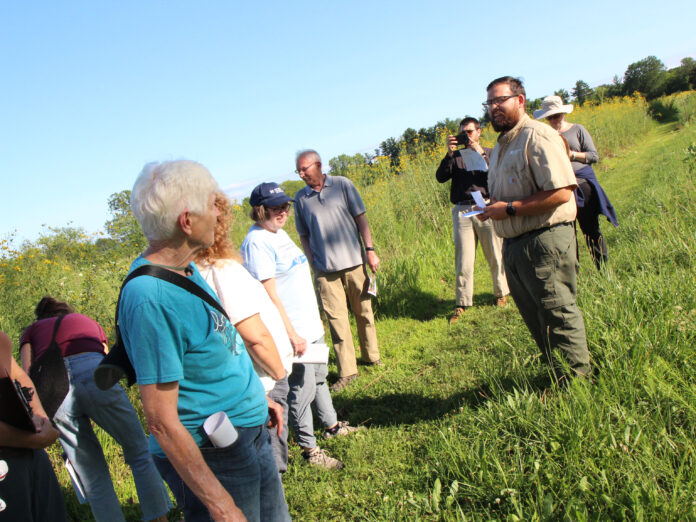

Pollinator prairies take root for Sacred Grounds Toledo program
SWANTON – The original motivation for installing a pollinator prairie at Faith Lutheran Church was simply to mow less.
When the congregation moved a little more than half a mile down the road four years ago, their new church home came with a huge increase in acreage, as well as square footage. The old building on the corner of Dodge and Walnut streets in the village of Swanton occupied about a third of an acre, while the new property sits on about five acres.
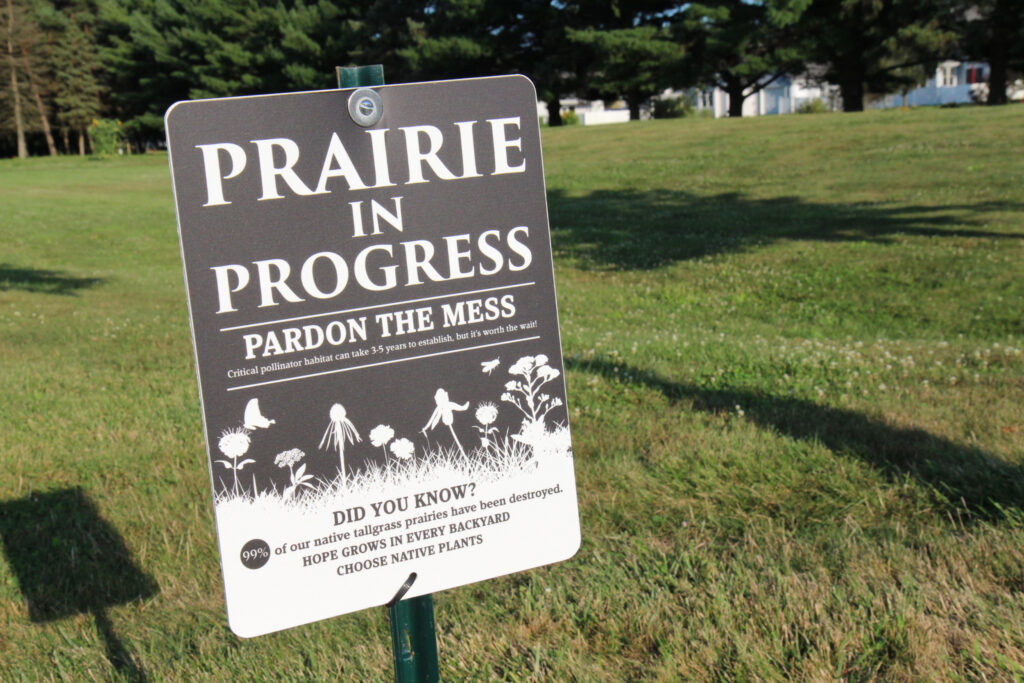

Zack Wertz, a lay leader with a background in natural resources, helped his congregation come up with the plan to transform about one fifth of that land into a native plant prairie and community garden. The first seeds were planted three years ago.
Since then, the pollinator prairie and community garden have grown to become a model for Sacred Grounds Toledo, a National Wildlife Federation program that recognizes houses of worship that create wildlife habitat and link faith practices with caring for the environment.
Wertz seeded the prairie with a blend from the Ohio Beekeepers Association that he combined with several types of grasses, choosing the mix for its high concentration of wildflowers. He says he wanted the prairie to be as bright and showy as possible to appease the concerns of anyone who may have worried about the less manicured appearance of the landscape.
The results have exceeded his expectations, with new blooms appearing each year. Plants include milkweeds, partridge pea, purple coneflower, black-eyed Susan and coreopsis. In the mornings “you can sit out there and hear all the bees. The thing actually hums,” said Wertz.
A growing movement
Wertz and his wife, Laura Wertz, welcomed visitors and shared their congregation’s prairie story Aug. 7 during a tour organized by Sacred Grounds Toledo. In addition to Faith Lutheran, the tour included stops to view a new prairie at Community of Christ Lutheran Church in Whitehouse and the cultivation fields of the Blue Creek Seed Nursery of Metroparks Toledo.
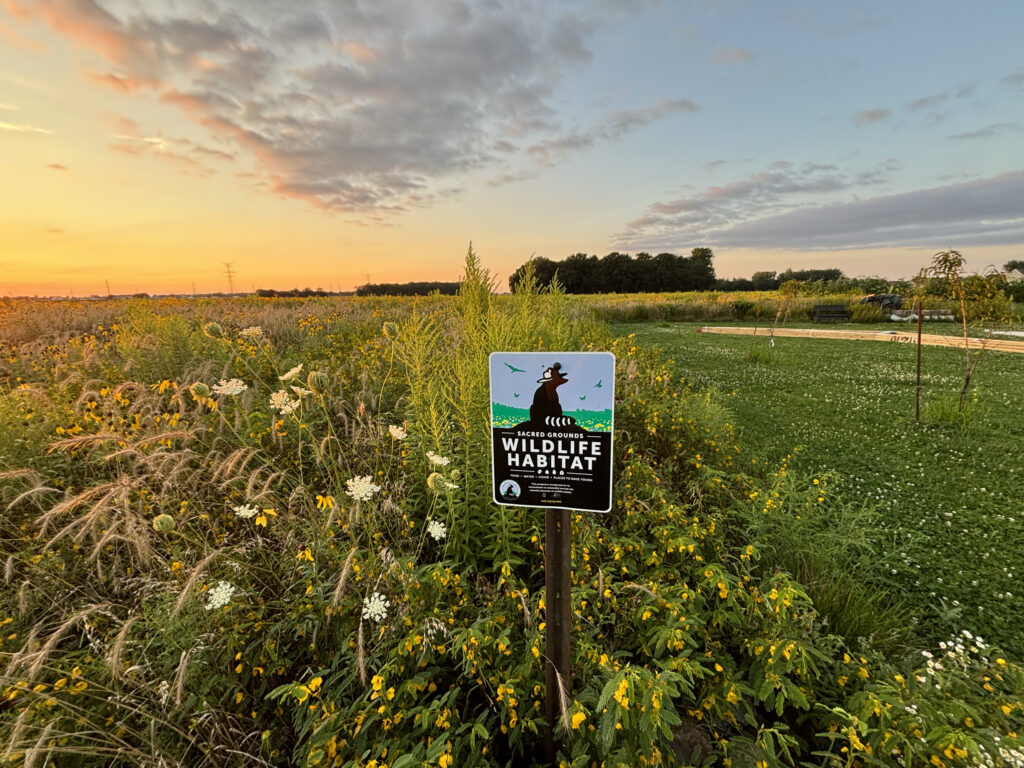

“What we hope to accomplish with this tour is to show people what’s possible in their faith community, in their own yard, and know that they don’t have to go it alone,” says Marilyn DuFour, a senior environmental specialist with the City of Toledo’s Division of Environmental Services.
DuFour brought the National Wildlife Federation program to Toledo with the help of Hal Mann, of the Oak Openings Region Chapter of Wild Ones, a nonprofit that promotes the benefits of growing native plants. They were inspired by a segment of Catherine Zimmerman’s documentary, Hometown Habitat, which featured the Sacred Grounds program in the Chesapeake Bay area.
Sacred Grounds Toledo is run under the umbrella of the Toledo-Lucas County Rain Garden Initiative with support from many local environmental organizations.
Houses of worship make a perfect partner in the native plant movement for a several reasons. “They usually have a lot of ground that they’re not using,” said Mann. “And it turns out that every faith tradition that I’m aware of has a core belief that we have to take care of the Earth.”
Sacred Grounds Toledo began in 2017 with five sites in northwest Ohio and has grown to include more 30 faith communities, including Christian, Jewish, Muslim and Buddhist. Gardens are located in both rural and urban settings, with some congregations adapting existing garden beds and others installing new ones.
“There’s no size stipulation. It’s really about providing habitat or stormwater management,” says DuFour.
Plants that are native to the region support pollinators such as bees and butterflies, improve water quality and create wildlife habitat, among other environmental benefits.
“Through the faith community lens, it’s all about stewardship of God’s creation and caring for God’s creation,” says DuFour. “But all of us who work in the environmental sciences know that there’s a lot of good that happens ecologically.”
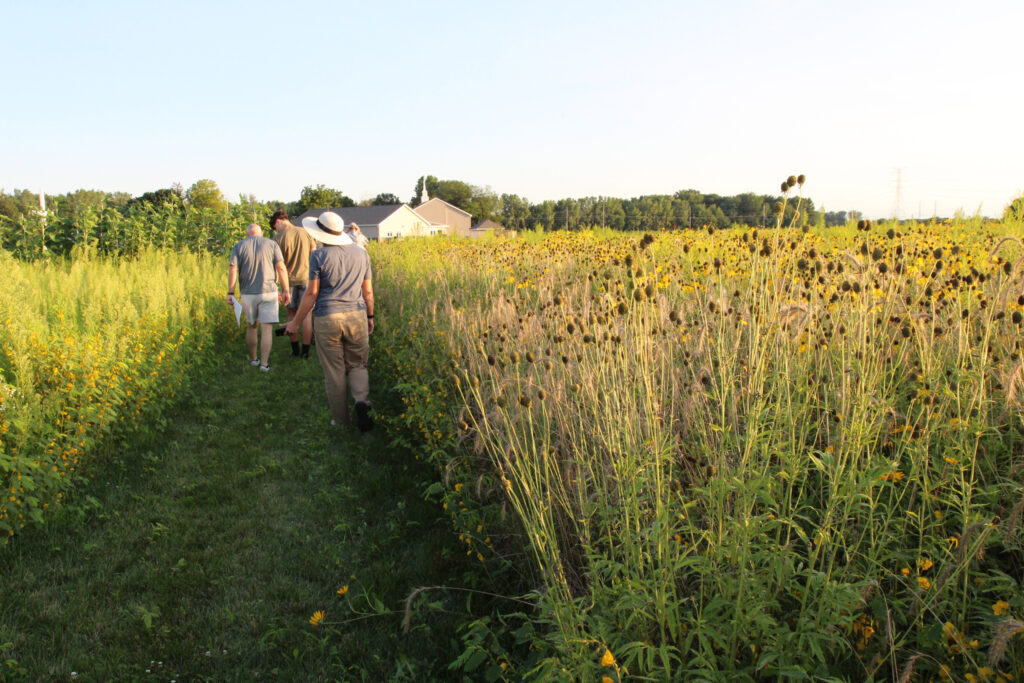

At Faith Lutheran, pastor Dalton Rosa-Ruggieri says the congregation has responded well to the prairie as “a beautiful part of God’s creation.” Many visitors have also come from other churches and organizations to learn from their example.
Adjacent to the prairie is a community vegetable garden that provides fresh food for Salem Lutheran Church in North Toledo. The church has incorporated this natural backdrop into worship by holding services outside during the warmer months. An outdoor pavilion is under construction this summer, and an asphalt path connecting it to the parking lot was added to improve accessibility.
“It’s a pretty important part of who we are at the church here,” said Rosa-Ruggieri. “This is a good way to steward the creation that we’ve been tasked with, to return back to maybe a more natural state, to encourage the pieces of creation that God put here to start with.”
